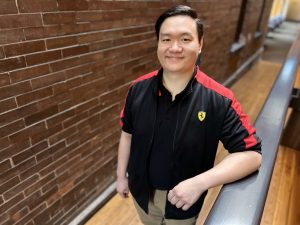
After Kevin Didi collects his Master’s in Economics from Convocation Hall on June 5th, he won’t be leaving the University of Toronto just yet. Kevin has accepted a pre-doctoral position with Professor Eva Vivalt working on the Social Science Prediction Platform. The tool, developed by Vivalt and her colleagues, aids in the collection, creation, and record-keeping of research project forecasts based on surveys of those working in the same areas of interest.
It’s a role that represents many different opportunities for Kevin.
“It’s very nice to be at the forefront of this kind of work, especially with Professor Eva, I’ll also be working with researchers at other universities getting surveys put up on our platform,” Kevin said. “But I think the single most important thing is the purpose of the platform, which is we want to give researchers the opportunity to have experts predict what their outcomes are going to be and then that will help them improve their own studies and improve their own results. I think it’s just a new way that the social science should be looking toward in terms of its data collection and how it reports data.”
Pre-docs are relatively new additions to the academic landscape in Canada. These temporary positions of one to three years in length are faculty-driven and pre-doc stipends are paid through their labs’ research budgets. In this case, Kevin was recruited with the assistance of the Forward Society Lab that, among other tasks, provides administrative support and promotes the work of Professor Vivalt and other affiliated researchers.
“I’m very excited to be working with Kevin,” said Professor Vivalt. “He is extremely well-prepared and will be a huge asset to the research team.”
These kinds of positions are generally taken up by people, like Kevin, who have finished a master’s degree, and are interested in pursuing PhD studies but aren’t completely ready to make that 5 to 7 year-long commitment. The desire to take a pause from a formal degree program and experience academic research from another vantage point is completely reasonable. At the University of Toronto, the Master’s in Economics program is a year long and many students begin their graduate studies immediately after completing their undergraduate degrees.
“I’ve been in school for five straight years now and it’s nice not to have to worry about marks, getting to classes, and things like that,” Kevin said. “I’d say taking this position is a mix of me needing a break from the grind of being a student and wanting to make myself more competitive for future studies, especially since I want to apply to PhD programs down in the states. And, I think just gaining a stronger research background, will give me an indicator of whether this is the thing I really want to do with the rest of my life!”
Kevin’s first years at the University of Toronto have been remarkable.
“Since 2018 Kevin was thrice my student and thrice the Head-TA/Course-Admin for the year-long course ECO204,” remembered Professor Ajaz Hussain. “Anyone who knows Kevin, whether faculty, peers, or students, will tell you he deserves accolades for his laudatory service to the student-community and for exemplifying the qualities of a superlative UofT scholar, teacher, and student.”
Kevin’s work as a TA, course administrator, and caring human was especially appreciated by Professor Hussain during the professor’s prolonged illness last year. Kevin went above and beyond the call of duty to ensure students were supported and the course ran smoothly.
“While his primary goal is research, Kevin has long understood that it is our collective duty at the UofT to enrich students’ university experience and to promote learning by instilling and furthering intellectual curiosity and learning,” Hussain said.
In looking back over his career at UofT thus far, Kevin’s memories of the MA in Economics program are positive. He has been part of a tight-knit learning community and it was a formative experience that will influence whatever decision he makes about a future PhD.
“Everyone in this cohort has been excellent to get to know,” he said. “You’re able to create such strong friend groups right from the start, while in your undergraduate courses, you’re moving around, and you don’t get to see the same people over and over again. You know, I’ll always remember those late nights studying, the chats that I’ve had with everyone in this cohort, but all the good memories really come from the people and the experiences that we’ve had throughout the past year together.”
Return to the Department of Economics website.
Scroll more news.
